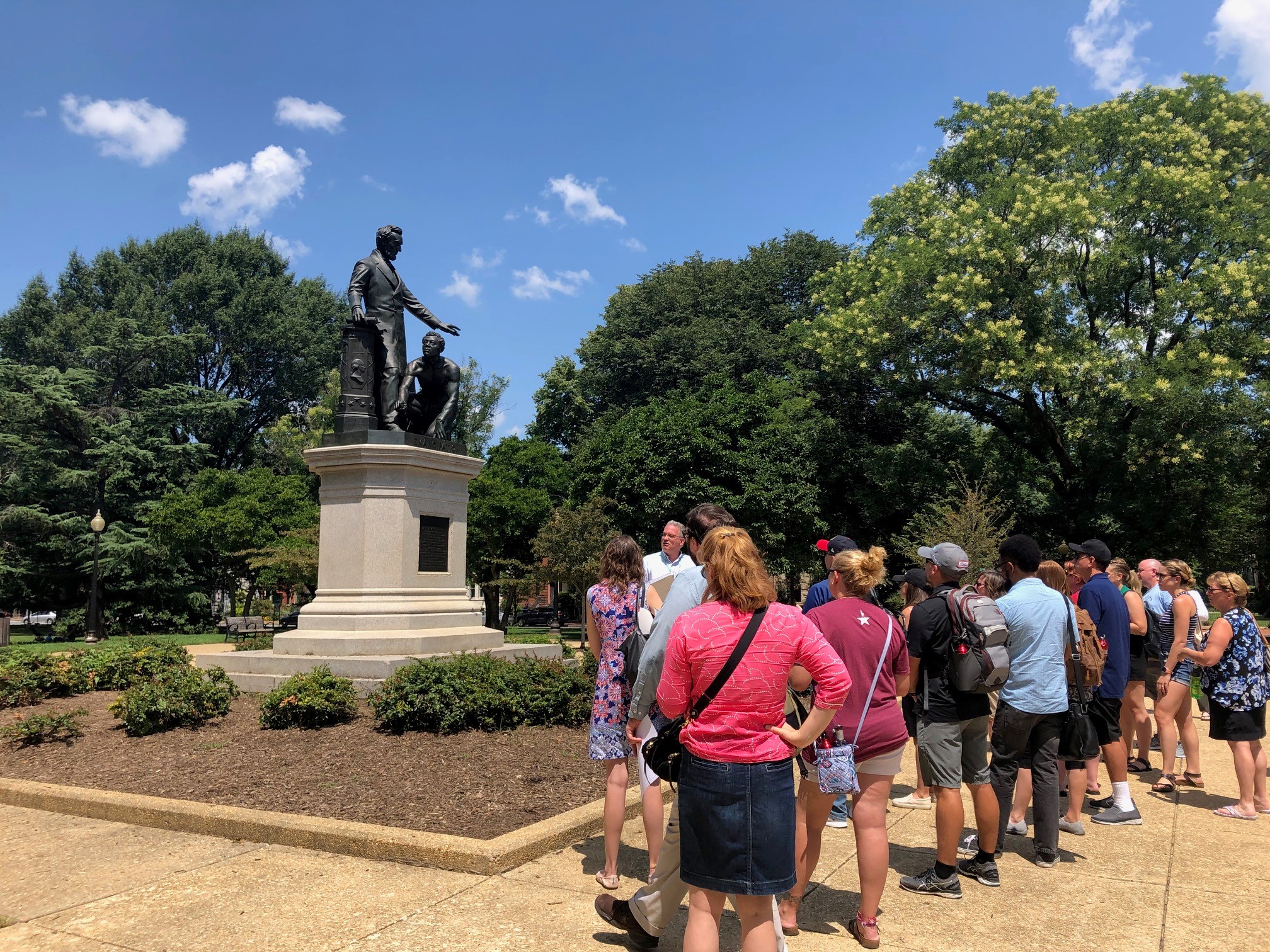
Monuments and Memorialization: A Resource Guide
In the last several years, how we remember and memorialize the Civil War has been a hot topic in the United States. Each year, some event or action brings it into sharp focus, and that is true yet again in June 2020.
Exploring how and by whom Civil War stories have been told over time empowers us to participate in shaping how we build our civic spaces and to use those spaces to tell American experiences. As a site of national memory and political violence, Ford’s Theatre is well positioned to provide a forum for such conversations.
At Ford’s Theatre we believe that the monument landscape is not static and should not be unchangeable. People create it, change it and expand it as we change and grow as a people and as a nation.
At Ford’s, we turn to history and primary sources to contextualize and interpret the monument landscape. Below are some of our staff’s recommendations as we each navigate our personal and professional responses to these nuanced and complicated discussions.

By no means is this list complete, but it is a beginning.
- For a robust, crowd-sourced and continually evolving list, check out this Confederate Monuments syllabus hosted by scholar and educator Kevin Levin.
- Dr. Hilary Green hosts a continually-updated map of monument removals, including Confederate monuments, around the world.
- On Monument Avenue, a website from the American Civil War Museum exploring debates about the statuary on Monument Avenue in Richmond, Virginia.
Ford’s staff members have written blog posts reflecting on our own work and understanding of memorialization:
- Alex Wood discusses the history of D.C.’s own Emancipation Memorial in Lincoln Park. She explores the historical context of the monument, why it was designed, who paid for it and what Frederick Douglass had to say at its dedication.
- Alex Wood reflects on Reconstruction and memorialization, in all their complexities, with teachers during our summer teacher institutes each year.
- Former intern Ian Robbins discusses how his internship changed how he would teach Reconstruction, knowing what he does now.
- Educator and summer institute participant Laura Aysen expresses how talking about memorialization with other teachers shaped her teaching and thinking.
Podcast Episodes (chronological by release date)
- Back Story: Contested Landscape | June 16, 2017. History and meanings of Confederate monuments and imagery—a helpful primer.
- More Perfect: American Pendulum II | Oct 2, 2017. What can reconciliation look like in the 21st century? Descendants of Dred and Harriet Scott and descendants of Chief Justice Roger Brooke Taney come together in 2017 to consider the question.
- Uncivil: The Spin | Nov 8, 2017. An exploration of the origins of and perpetuation of the Lost Cause mythology.
- Rogue Historian: African Americans Respond to Racism and the Early Film Industry with Ashleigh Lawrence-Sanders | October 30, 2019. A wide-ranging discussion, with an emphasis on African Americans’ long fights against the myth of the Lost Cause.
In this above episode of the Ford’s “Cabinet Conversations” series, Dr. Hilary Green and Kevin Levin discuss how we remember and memorialize the Civil War, and how the legacies of the Lost Cause impact our world today.
Films and Videos
- Ava DuVernay’s documentary feature film 13th (2016).
- The four-part PBS series Reconstruction: America After the Civil War (2019).
- TED Talk on “Confronting hard history” with Hasan Kwame Jeffries.
Articles and blog posts (alphabetical by author)
- “Confederate Memorial Timeline” from Southern Poverty Law Center. This infographic shows when most Confederate memorials came onto the scene, along with historical context.
- “Slavery Did Not Die Honestly” by David Blight.
- “How to Remember Reconstruction” by Gregory P. Downs and Kate Masur.
- “The Making and the Breaking of the Legend of Robert E. Lee” by Eric Foner.
- “Teaching Reconstruction: Some Strategies that Work” by Hilary N. Green. While written for teachers, this piece offers helpful ways for everyone to think about Reconstruction and its legacy.
- “The Cinematic Lost Cause” by Eileen Jones.
- “Black Charleston and the Battle over Confederate Statues” by Ashleigh Lawrence-Sanders.
- “Black Bostonians Fought for Freedom from Slavery. Where Are the Statues That Tell Their Stories?” by Kevin M. Levin.
- “Why We Need a New Civil War Documentary” by Keri Leigh Merritt.
- “How to Teach the Civil War in the Deep South” by Kristina Rizga. This piece offers helpful ways for everyone to think about where our information is coming from.
Books (alphabetical by author)
- Dixie’s Daughters: The United Daughters of the Confederacy and the Preservation of Confederate Culture (New Perspectives on the History of the South), by Karen L. Cox.
- The Second Founding: How the Civil War and Reconstruction Remade the Constitution, by Eric Foner.
- Shadowed Ground: America’s Landscapes of Violence and Tragedy, by Kenneth E. Foote.
- Searching for Black Confederates: The Civil War’s Most Persistent Myth, by Kevin M. Levin.
- How the South Won the Civil War: Oligarchy, Democracy, and the Continuing Fight for the Soul of America, by Heather Cox Richardson.
Alex Wood is Education Programs Manager at Ford’s Theatre. Follow her on Twitter: @xela415, @FordsEdu.
David McKenzie is Associate Director for Interpretive Resources at Ford’s Theatre. Follow him on Twitter @DPMcKenzie.
Jake Flack is Associate Director for Museum Education at Ford’s Theatre.

